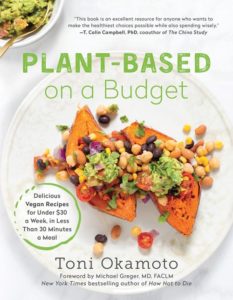
“People often think that to eat healthy and plant-based, you have to go to an entirely different grocery store and buy expensive, unfamiliar ingredients,” says Toni, author of Plant-Based on a Budget (BenBella, 2019) and founder of plantbasedonabudget.com.
But if you do the math, healthy eating is the clear winner. “Fast foods and packaged foods aren’t as cheap as people think,” explains Okamoto, whose daily lunch in high school was from Taco Bell and who has watched several family members struggle with health issues because of a poor diet. A fast-food meal usually ends up costing around $6 or $7, while if you shop and cook smart, you can have a nourishing, whole-food diet for roughly $1.20 per meal.
Here’s how:
Learn How to Cook Vegetables
“I grew up eating Top Ramen and mac and cheese,” Okamoto says, “so I totally understand that it’s intimidating when you pass by a butternut squash in the grocery store, and you’re like, ‘What the heck is this?’” Educate yourself by checking out cookbooks from the library (try How to Cook Everything Vegetarian [Houghton Mifflin Harcourt, 2017] by Mark Bittman) or visiting sites like Okamoto’s.
Plan Your Plant-Based Meals Wisely
For Okamoto, who was on a very tight budget when she switched to vegan eating, this was the biggest game-changer. Assess what you have on hand, and plan meals that use those ingredients, she suggests. When you shop, stock up on filling items—like beans, quinoa, brown rice, oats, corn tortillas and vegetable bouillon—that can be used in multiple dishes.
Shop With Intention
Go in with a game plan, and stick to your list to prevent impulsive purchases, Okamoto says. When possible, avoid premade and packaged foods, which are more expensive. She recommends looking for store brands, which often contain the exact same ingredients but cost less. Buy only the fresh produce you know you’ll eat, and fill your freezer with frozen fruits and vegetables, which are just as nutritious. Also, keep an eye out for imperfect produce, and consider asking the store for a discount. Some stores have shelves with “ugly” fruits and veggies at a discount.
Choose a Prep Day for Your Plant-Based Meals
“I use one day of the week to cook a lot of my staples, like lentils and beans and quinoa,” Okamoto says. “That way, when the work week is picking up, we can use those and just steam some vegetables and add a sauce instead of resorting to fast food or other unhealthy options.”
Repurpose Your Veggies
Make a large batch of a recipe and find ways to tweak it throughout the week. For example, Okamoto might make split pea soup and eat it plain that night. Day two: She adds lemon juice and hot sauce. Day three: She adds liquid smoke for a more traditional flavor. Day four: The peas will have absorbed a lot of the moisture, so she’ll serve it over brown rice. “That way, I’m cooking only one time, it costs me $5 to make that whole meal for all those days, and I can vary it up, not making myself hate something I actually love,” she says.
@plantbasedonabudget / Toni Okamoto, author of Plant-Based on a Budget, offers free weekly meal plans for one to four people. Visit plantbasedonabudget.com.

